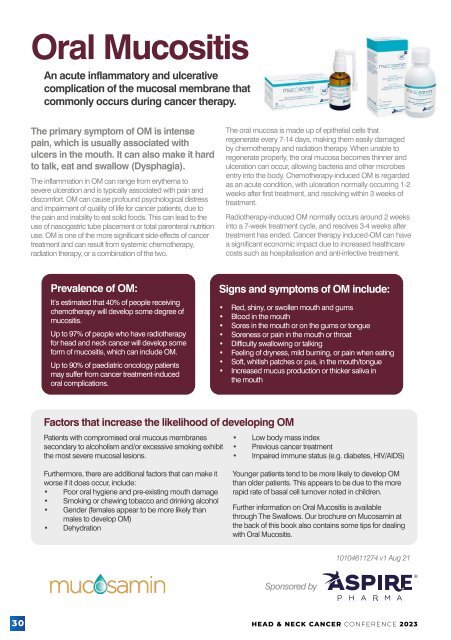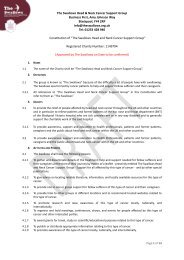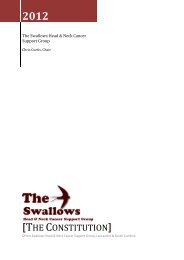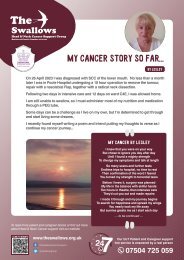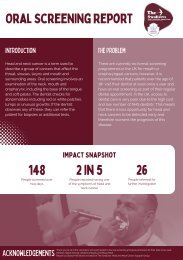2023 Head & Neck Cancer Conference Guide Book
You also want an ePaper? Increase the reach of your titles
YUMPU automatically turns print PDFs into web optimized ePapers that Google loves.
Oral Mucositis<br />
An acute inflammatory and ulcerative<br />
complication of the mucosal membrane that<br />
commonly occurs during cancer therapy.<br />
The primary symptom of OM is intense<br />
pain, which is usually associated with<br />
ulcers in the mouth. It can also make it hard<br />
to talk, eat and swallow (Dysphagia).<br />
The inflammation in OM can range from erythema to<br />
severe ulceration and is typically associated with pain and<br />
discomfort. OM can cause profound psychological distress<br />
and impairment of quality of life for cancer patients, due to<br />
the pain and inability to eat solid foods. This can lead to the<br />
use of nasogastric tube placement or total parenteral nutrition<br />
use. OM is one of the more significant side-effects of cancer<br />
treatment and can result from systemic chemotherapy,<br />
radiation therapy, or a combination of the two.<br />
Prevalence of OM:<br />
It’s estimated that 40% of people receiving<br />
chemotherapy will develop some degree of<br />
mucositis.<br />
Up to 97% of people who have radiotherapy<br />
for head and neck cancer will develop some<br />
form of mucositis, which can include OM.<br />
Up to 90% of paediatric oncology patients<br />
may suffer from cancer treatment-induced<br />
oral complications.<br />
The oral mucosa is made up of epithelial cells that<br />
regenerate every 7-14 days, making them easily damaged<br />
by chemotherapy and radiation therapy. When unable to<br />
regenerate properly, the oral mucosa becomes thinner and<br />
ulceration can occur, allowing bacteria and other microbes<br />
entry into the body. Chemotherapy-induced OM is regarded<br />
as an acute condition, with ulceration normally occurring 1-2<br />
weeks after first treatment, and resolving within 3 weeks of<br />
treatment.<br />
Radiotherapy-induced OM normally occurs around 2 weeks<br />
into a 7-week treatment cycle, and resolves 3-4 weeks after<br />
treatment has ended. <strong>Cancer</strong> therapy induced-OM can have<br />
a significant economic impact due to increased healthcare<br />
costs such as hospitalisation and anti-infective treatment.<br />
Signs and symptoms of OM include:<br />
• Red, shiny, or swollen mouth and gums<br />
• Blood in the mouth<br />
• Sores in the mouth or on the gums or tongue<br />
• Soreness or pain in the mouth or throat<br />
• Difficulty swallowing or talking<br />
• Feeling of dryness, mild burning, or pain when eating<br />
• Soft, whitish patches or pus, in the mouth/tongue<br />
• Increased mucus production or thicker saliva in<br />
the mouth<br />
SUPPORT<br />
BOXES<br />
Thanks to the Friends of the Swallows we are<br />
sending Support Boxes to <strong>Head</strong> & <strong>Neck</strong> <strong>Cancer</strong> Patients<br />
to help them with the side effects of treatment<br />
To order your box please email<br />
info@theswallows.org.uk<br />
with your full name, address,<br />
telephone number and hospital details<br />
AVERAGE POSTAL<br />
COST PER BOX<br />
£10<br />
PLEASE HELP BY DONATING<br />
For people undergoing radiotherapy and chemotherapy<br />
SCAN THE QR CODE WITH YOUR PHONE CAMERA<br />
Factors that increase the likelihood of developing OM<br />
Patients with compromised oral mucous membranes<br />
secondary to alcoholism and/or excessive smoking exhibit<br />
the most severe mucosal lesions.<br />
• Low body mass index<br />
• Previous cancer treatment<br />
• Impaired immune status (e.g. diabetes, HIV/AIDS)<br />
Furthermore, there are additional factors that can make it<br />
worse if it does occur, include:<br />
• Poor oral hygiene and pre-existing mouth damage<br />
• Smoking or chewing tobacco and drinking alcohol<br />
• Gender (females appear to be more likely than<br />
males to develop OM)<br />
• Dehydration<br />
Younger patients tend to be more likely to develop OM<br />
than older patients. This appears to be due to the more<br />
rapid rate of basal cell turnover noted in children.<br />
Further information on Oral Mucositis is available<br />
through The Swallows. Our brochure on Mucosamin at<br />
the back of this book also contains some tips for dealing<br />
with Oral Mucositis.<br />
10104611274 v1 Aug 21<br />
Treating the painful symptoms of oral<br />
mucositis, helping to protect lesions<br />
and promote healing.<br />
For the management of radiotherapy<br />
and chemotherapy skin lesions<br />
supporting the reduction of skin<br />
inflammation and associated pain.<br />
Sponsored by<br />
For more information please visit our stand on 8-9th November or email jalosome@mediuk.co.uk<br />
30 HEAD & NECK CANCER CONFERENCE <strong>2023</strong><br />
jalosome@mediuk.co.uk<br />
medi. I feel better.


